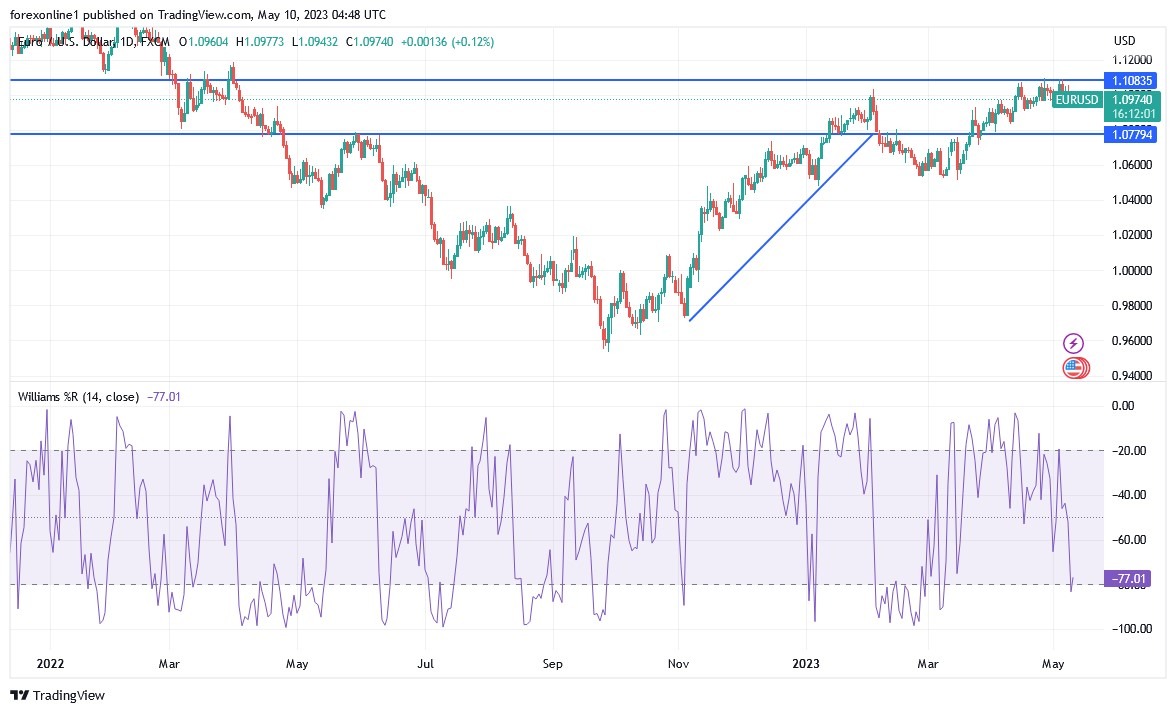The EUR/USD exchange rate entered a shorter week's trading due to the holidays. It tried to hold on to the psychological resistance 1.1000 but was temporarily exposed to selling operations that pushed it towards the support level 1.0942, before settling around 1.0960 at the time of writing. EUR/USD is in a cautious waiting mode for the announcement of US inflation numbers.
Overall, the single European currency - the euro - underperformed all major currencies except the dollar for the week through Tuesday while it rose in relation only to the Chinese renminbi, Brazilian real and Turkish lira when measured on a broader G20 basis but could also remain lagging in the near future. The losses accumulated after European Central Bank President Christine Lagarde said last Thursday that interest rates are likely to rise further in the future and until it becomes clear that monetary policy is “enough tight” to return inflation to a reasonable 2% target.
But the euro came under additional pressure when the statistics agency said German factory orders fell by more than 10% in March, their biggest drop since the pandemic's early economic shutdown, and after Eurostat said European retail sales fell by more than 1% in the same month. Commenting on this says Brent Donnelly, CEO at Spectra Markets and a veteran trader who has spent his career at Global Banks such as Lehman Brothers, HSBC and Nomura. “German inflation is high, ECB meeting in the background, German manufacturing and retail sales data weren't that bad together in one month since 2008.”
It is not yet clear if the latest data means that there is an economic crisis underway but that is the risk and direction of travel as the ECB's more hawkish monetary policy tightening begins to show in the real economy. This increases the importance of emerging economic data in the future, especially from the larger economies in Europe, but it will become more dangerous for the euro if any economic deterioration leads to a reconsideration of the interest rate expectations of the European Central Bank.
This is a quiet week in the European calendar, but US inflation figures on Wednesday could affect the EUR/USD rate and will be booked by speeches from European Central Bank Executive Board members Philipp Lane and Isabel Schnabel. According to the analyst, “I do not want to open long positions in US dollars this week, with inflation in the US being the main story and the debt ceiling in the background. Therefore, selling the euro/dollar pair does not suit me, although it is easy to manage the risk with a stop above 1.1125.” “I think that in the same way that economists underestimated the speed of inflation in the United States, they will reduce the speed of decline. Therefore, selling the euro for the dollar does not make sense.”
The consensus of economists is that inflation was likely unchanged at 5% last month while the more important core inflation rate is seen managing only a minimal reversal of its previous value upwards from 5.5% to 5.6%. This sets a low bar for a surprise to the downside and further pressure on the US dollar if easing price pressures partially justifies financial markets for betting heavily in recent weeks that the Fed is likely to cut rates three times at the end of the year.
Euro predictions against the dollar today:
- The bulls will continue to control the performance of the euro against the US dollar, EUR/USD.
- The psychological resistance 1.1000 supports the bullish outlook.
- There will be no initial shift to the downside without moving towards the support levels 1.0920 and 1.0850, respectively.
- This may happen if the US inflation figures today support the path of tightening the US Federal Reserve's policy.
On the other hand, and for the same time period, if today's figures support the cessation of the US tightening policy, the bulls may find the opportunity to move upwards towards the resistance levels 1.01040 and 1.1120, respectively.
Ready to trade our daily Forex forecast? Here’s a list of some of the best regulated forex brokers to check out.


